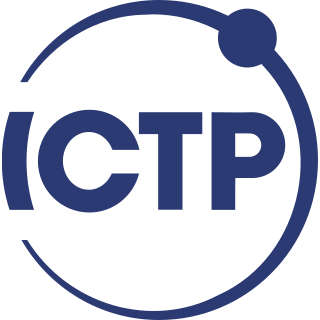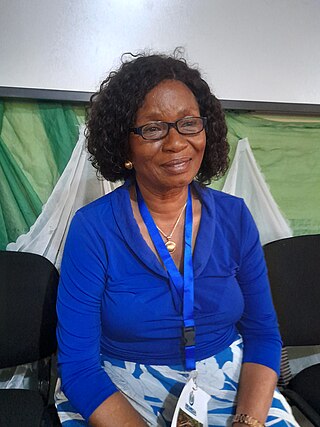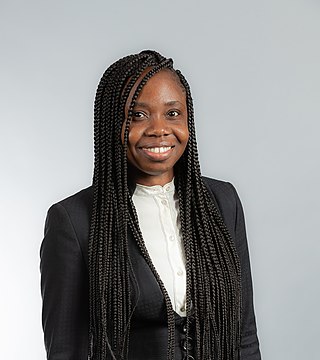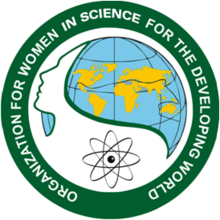
Science Foundation Ireland was a statutory body in Ireland. It was an agency of the Department of Further and Higher Education, Research, Innovation and Science, with responsibility for funding oriented basic and applied research in the areas of science, technology, engineering and mathematics (STEM) with a strategic focus. The board of SFI was appointed by the Minister for Further and Higher Education, Research, Innovation and Science.

The World Academy of Sciencesfor the advancement of science in developing countries (TWAS) is a merit-based science academy established for developing countries, uniting more than 1,400 scientists in some 100 countries. Its principal aim is to promote scientific capacity and excellence for sustainable development in developing countries. It was formerly known as the Third World Academy of Sciences. Its headquarters is located on the premises of the International Centre for Theoretical Physics in Trieste, Italy.

The Abdus Salam International Centre for Theoretical Physics (ICTP) is a research center for physical and mathematical sciences, located in Trieste, Friuli-Venezia Giulia, Italy.

The Australian Centre for International Agricultural Research (ACIAR) is an Australian Government statutory agency that forms part of the overseas aid program in the Foreign Affairs and Trade Portfolio, reporting to the Minister of Foreign Affairs. ACIAR was established under the Australian Centre for International Agricultural Research Act 1982, as amended, to identify agricultural problems in developing problems and brokers Australian agricultural scientists to find solutions.
The International Human Frontier Science Program Organization (HFSPO) is a non-profit organization, based in Strasbourg, France, that funds basic research in life sciences. The organization implements the Human Frontier Science Program (HFSP) and is supported by 14 countries and the European Commission. Shigekazu Nagata is the HFSPO President and Chair of the Board of Trustees since 2018.

Francisca Nneka Okeke is a Nigerian physicist. She is a Professor of Physics at the University of Nigeria, Nsukka and first female head of a department in the University.
Qudsia Tahseen is a Professor of Zoology at Aligarh Muslim University and teaches Animal Ecology as well as Nematology to the students of the Masters programme. Her areas of research include taxonomy and developmental biology of terrestrial and aquatic nematodes. Her thrust areas are Biodiversity, Taxonomy, Ecology and developmental biology of soil and fresh water nematodes. She is a fellow of two national science academies of India.
Nashwa Abo Alhassan Eassa is a nano-particle physicist from Sudan. She is an assistant professor of physics and Dean of the Deanship of Scientific Research at Al-Neelain University in Khartoum.
Joseph H. Hulse (1923–2013) was a Canadian biochemist, food technologist, writer, and the president of the International Union of Food Science and Technology. He chaired the Committee of the Canadian chapter of the Freedom From Hunger, presided over the Canadian Institute of Food Science and Technology and was the assistant director of nutrition at the Food and Agriculture Organization, besides serving as the vice president of the International Development Research Centre (IDRC). He was the author of several texts and monographs on nutrition and allied sciences, including a 991-page treatise, Sorghum and the Millets: Their Composition and Nutritive Value. The Government of India awarded him the fourth highest civilian honour of the Padma Shri, in 2008, for his contributions to Science and for his humanitarian activities in India.
Rabia Salihu Sa'id is a Nigerian physicist, professor of atmospheric and space-weather physics, and a researcher at Bayero University Kano. She conducts research in atmospheric and space weather physics, particle physics, and electronics. Sa'id is an advocate and mentor for young women in science with the Visiola Foundation and Peace Corps; she co-founded Nigeria's Association of Women Physicists. She is an advocate and mentor of Science, technology, engineering, and mathematics (STEM) education and is a facilitator for the British Council's Active Citizens' Programme.
Lubna Hamid Tawfiq Tahtamouni is a Jordanian biologist known for her work in developmental biology and cancer research. She is the head of the Department of Biology and Biotechnology at Hashemite University in Zarqa, Jordan. She has won multiple awards for her work on breast cancer, and is known as an advocate for allowing young women in the Arab world to choose a career in science. In 2016, she was named one of BBC's 100 Women.
Science and technology in Armenia describes trends and developments in science, technology and innovation policy and governance in Armenia.
Science and technology in Uzbekistan examines government efforts to develop a national innovation system and the impact of these policies.

Nina Dudnik is an American social entrepreneur, science diplomacy advocate, and the Founder and former CEO of Seeding Labs, a US-based nonprofit organization investing in building scientific capacity in the developing world. Dudnik founded the organization in 2003 as a graduate student studying at Harvard University, where she received her PhD in molecular biology.

Priscilla Kolibea Mante is a Ghanaian neuropharmacologist, a researcher and lecturer from Kwame Nkrumah University of Science and Technology, currently based at the Kumasi campus. Her research work focuses on alternatives of plant-based therapeutic options to manage drug-resistant epilepsy and the neglected tropical disease neurocysticercosis. In her work, she mostly explores the anticonvulsant activity of the plant alkaloid cryptolepine and its solid-lipid nanoparticles in the management of neurocysticercosis-induced epilepsy. Her goal is to identify a way to help cryptolepine permeate more efficiently into the central nervous system to reduce the risk of convulsion, helping patients to manage their condition as effectively as possible. Aside from her studies of epilepsy, Mante has also worked toward new therapies to alleviate pain, anxiety, and depression.

Marian Asantewah Nkansah is a Ghanaian environmental chemist. Her research work focuses on finding solutions to environmental problems associated with levels and fate of toxic substances such as heavy/trace metals, persistent organic pollutants (POPs) and polycyclic aromatic hydrocarbons (PAHs) in food, water, soil, rocks, sediments and other environmental samples. She also researches on the interaction of these pollutants with each other in the environment. In 2016, together with some scientists from the Kwame Nkrumah University of Science and Technology, she led a research which led to the confirmation that edible white clay poses potential cancer risk. In 2016, she became the first scientist to win the Fayzah M. Al-Kharafi Prize, an annual award that recognises exceptional women scientists from scientifically and technologically lagging countries. She and Collins Obuah, another scientist from the University of Ghana, were the two scientist selected to attend the Lindau Nobel Laureate meeting in 2017. In 2021, she was among five women recipients in developing countries of the OWSD-Elsevier Foundation Awards. She received the 2022 Africa Role Model Overall Female Personality Award, and was inducted as a Fellow of the Ghana Academy of Arts and Sciences the same year.

Dr. Renu Swarup is an Indian geneticist and former Secretary, Government of India, formerly heading the Department of Biotechnology (DBT), Ministry of Science and Technology. She has actively contributed in the formulation of India's Biotechnology Vision and Strategy. She is credited with the establishment of India's largest microbial resource centre, Microbial Culture Collection.

Mercedes B. Concepcion is a Filipino social scientist who was named a National Scientist of the Philippines in 2010. Concepcion was also dubbed the "Mother of Asian Demography" because of her contributions in population studies and policy within the region. In 2002, she was named the "First Filipino Demographer" by the Philippine American Foundation. A few years later, she won the 2005 United Nations Population Award for her outstanding work in population studies on social and economic development, urbanization, and public health and welfare. Concepcion is currently the Vice President of the Executive Council of the National Academy of Science and Technology (NAST) and is a Trustee for both the Philippine Center for Population and Development (PCPD) and Foundation for Adolescent Development, among several other roles.
Alice Norah Nabatanzi, is a Ugandan researcher and academic scientist at Makerere University, Uganda's oldest and largest public university, where she earned a doctorate degree at age 28.










